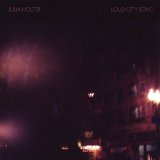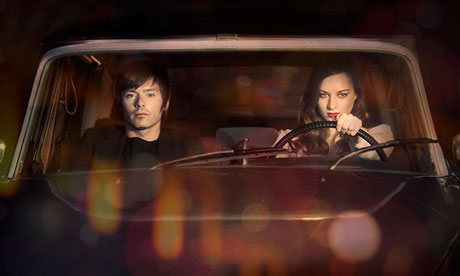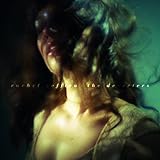 Julia Holter is still an experimental artist but this, her third album, puts her voice in a clear spotlight with the fog of last year’s outstanding “Ekstasis” having almost completely cleared with a brightness and more straightforward mood taking its place. With Holter straightforward equals a concept of sorts that references “Gigi” the book, film and musical which starred Audrey Hepburn in the title role and also contemporary celebrity culture. It’s interesting that” Loud City Song”, her most accessible album to date, shares themes that have already been appropriated by pop queens Madonna and Lady Gaga but rest assured neither generation of pop icon is likely to make an album that sounds anything like “Loud City Song”.
Julia Holter is still an experimental artist but this, her third album, puts her voice in a clear spotlight with the fog of last year’s outstanding “Ekstasis” having almost completely cleared with a brightness and more straightforward mood taking its place. With Holter straightforward equals a concept of sorts that references “Gigi” the book, film and musical which starred Audrey Hepburn in the title role and also contemporary celebrity culture. It’s interesting that” Loud City Song”, her most accessible album to date, shares themes that have already been appropriated by pop queens Madonna and Lady Gaga but rest assured neither generation of pop icon is likely to make an album that sounds anything like “Loud City Song”.
An angelic acapella cry of ‘Heaven’ is the first thing heard on “World” which slowly introduces piano and then strings with lyrics about hiding behind the brim of your hat in a city that’s too interested in you. She wants to live in a city, in her apartment block on the fifth floor, but is exhausted and bored by the intense scrutiny of strangers. Like many of the songs here, this starts quiet and pure but becomes increasingly crowded and tense as things progress. Like the climate in her native LA, occasional volatile moods can disrupt the calm but the release is restorative.
Maxim’s was the restaurant favoured by judgemental Parisian society featured in “Gigi” and there are two variations of a song named after it here which form the foundations that the remaining material sits upon. “Maxim’s I” is played in slow motion, dreamy and not fully conscious; it toughens up for a piano and violin-pricked middle eight and then dissolves again. Later on in the album “Maxim’s II” is experiencing the restaurant when it’s reservations only, noisy and overly stimulating with snatches of isolated senseless conversations ‘Tonight the birds are watching me, do they have more important things to do?’. It has a big beat and is sung-spoken by Holter in a way that is reminiscent, as is the whole track, of art-pop Grande Dame Laurie Anderson during her most commercially successful, early eighties period.
“Horns Surrounding Me” starts with a recording of a man running and breathing heavily, being chased by what can be presumed to be the paparazzi. It doesn’t disappoint with its horns pay off and is sonically grand and classical in a traditional sense. “Hello Stranger” is a cover of the Barbara Lewis r’n’b classic from the early sixties and Holter treats it as an ironic David Lynch Julee Cruise standard. Suspended keyboards and haunted vocals leading to eventual confusion and distress which is continued through to the plaintive, Angelo Badalamenti-like piano ballad “He’s Running Through My Eyes”. The throbbing double bass and deadpan repetition of the line ‘there’s a flavour to the sound of walking no one ever noticed before’ of “In the Green Wild” is all quirk and twitch in the best possible sense.
“Loud City Song” is certainly Julia Holter’s most musical album to date and is structured in a way that is, more than anything, typical of a musical play, much like its reference points. It is simultaneously very old-fashioned in its use of instruments and arrangements and modern in the way it stops short of any clear categorisation. The songwriting itself is maybe less evolved than “Ekstasis”; nothing quite matches that album’s “In the Same Room” for simplicity and immediacy, but its strengths lie elsewhere. As an artist Holter and her LA-based work keeps moving forward at a tireless, restless place and on “Loud City Song” she has made something that is intimate, warm and far more approachable than ever before.
 If you like the thought of the dreamy, synth pop of French duo Air (“Sexy Boy”) mixed with the more angular, detached malaise of London’s New Young Pony Club (“Ice Cream”) then Tomorrow’s World’s eponymous debut album will be right up your darkly lit, probably by some French auteur, alleyway. This is mainly because Lou Hayter and Jean Benoit Dunckel are in fact the keyboardist in New Young Pony Club and half of Air respectively. Lou Hayter sings with precision and grace on every track here and the whole thing sounds pretty much how you would like it to and expect it to given the artists involved.
If you like the thought of the dreamy, synth pop of French duo Air (“Sexy Boy”) mixed with the more angular, detached malaise of London’s New Young Pony Club (“Ice Cream”) then Tomorrow’s World’s eponymous debut album will be right up your darkly lit, probably by some French auteur, alleyway. This is mainly because Lou Hayter and Jean Benoit Dunckel are in fact the keyboardist in New Young Pony Club and half of Air respectively. Lou Hayter sings with precision and grace on every track here and the whole thing sounds pretty much how you would like it to and expect it to given the artists involved.
The best tracks certainly recall early, peak period Air along with, and possibly because of, the cross-cultural mix of French and English, the work that they did with Charlotte Gainsbourg. “Life on Earth” is a doppelgänger for Gainsbourg’s “5:55” and the sweet and sour drunkenness of “Pleurer et Chanter”, the only French language song and a definite highlight, could have featured on either of her last 2 albums. “Metropolis” could be from “Moon Safari” and wouldn’t have affected the consistently high quality of Air’s debut album and “Drive” has a guitar lick and kick that immediately recalls Hayter’s work with New Young Pony Club. “You Taste Sweeter” is vocally and sonically early Ladytron to a T (“Sugar” anyone?) and “Don’t Let Them Bring You Down”, a plaintive, piano-led ballad is very Twin Peaks and the kind of song that, this time around, Donna Heyward could have sung to James Hurley whilst simultaneously crying at the Bang Bang Bar.
It’s only on the muddy, crawling “Catch Me” where Hayter, sharing the chorus with Dunckel, pleads ‘Dark Angel, take me away’ that a sound begins to emerge that could be considered as belonging to “Tomorrow’s World” and not referencing their own work or, at least not obviously, that of any other artist. The album ends with the yearning “Inside” which appears to be a tribute to Julee Cruise’s enormously influential “Mysteries of Love” with the final two minutes morphing into a stuttering, repetitive malfunctioning computer that wouldn’t have dared disturb the calm of Cruise’s ballad. It’s a perfect closer and the only other example here of Hayter and Dunckel creating something more unique to them, at least in sound if not content.
Even though the duo are guilty of overusing core elements and sounds lifted from their past work to a greater or lesser degree in almost every track here, this is to a certain degree unavoidable and is also responsible, in part, for creating some of the gorgeous, hazy cinematic passages here which I would strongly urge you to seek out. A few more dark angels though and they’ll have their very own, new, world to inhabit, one I would love to experience.
 This time last year, when I was considering my top 5 albums of 2011, I had no hesitation in including the sublime eponymous debut album from the Horrors front man Faris Badwan and classically trained, both musically and vocally, Rachel Zeffira duo; Cat’s Eyes. On the tracks where she took lead vocal, Rachel created images of sad, 1950’s high school girls lost in the alienating fog of a very David Lynch, night-time world; it was heartbreaking. There are in fact many similarities to Zeffira’s style and that of Julee Cruise; Lynch and composer Angelo Badalementi’s definitive nightclub chanteuse, and her (surely?) classic album ‘Floating Into the Night’ released at the tail end of the nineties and during Lynch’s successful ‘Twin Peaks’ period; but more on that later.
This time last year, when I was considering my top 5 albums of 2011, I had no hesitation in including the sublime eponymous debut album from the Horrors front man Faris Badwan and classically trained, both musically and vocally, Rachel Zeffira duo; Cat’s Eyes. On the tracks where she took lead vocal, Rachel created images of sad, 1950’s high school girls lost in the alienating fog of a very David Lynch, night-time world; it was heartbreaking. There are in fact many similarities to Zeffira’s style and that of Julee Cruise; Lynch and composer Angelo Badalementi’s definitive nightclub chanteuse, and her (surely?) classic album ‘Floating Into the Night’ released at the tail end of the nineties and during Lynch’s successful ‘Twin Peaks’ period; but more on that later.
Whilst there were some industrial sounds and more explicit 1960’s surf pop influences played out on the Cat’s Eyes album, Zeffira has really homed in on the baroque, classical elements that always sonically threatened to take over their debut and, understandably, seem to be where she excels and feels most comfortable. And where that album cast her as a schoolgirl steeped in adolescent angst, albeit in a very adult sounding setting (“The Best Person I Know”, “I’m Not Stupid”), this is told from a far more adult perspective where decisions have been considered and consequences accepted and reflected upon. The sadness and beauty is striking and “The Deserters” captures the sense of loss, or change, at least, in almost every song. 7 out of the 10 songs here (which include a lush version of the My Bloody Valentine song “To Here Knows Where”) feature either the words ‘go’, ‘gone’ or goodbye’; the title track doesn’t but then it doesn’t need to.
Rachel Zeffira’s angelic, soprano vocals (Canadian born, but now living in London, she shockingly references Brixton in one song) are sometimes multi-tracked and often have a slight reverb which in no way detracts from the emotional strength delivered and along with the pop song sensibility and the subtleness of the orchestra used in many of the tracks this is not, maybe surprisingly, a depressing album. “Break the Spell” swirls and beats strongly enough for you to dance to it (listen to those plush harps!) whilst “Goodbye Divine” with its blaring cathedral organ is a winter hymn. “Letters from Tokyo (Sayonara)” begins with a carousel effect, a piano with the lyrics confessing ‘You won’t hear from me anymore, I told many lies and hid many more; nothing can make me change my mind’ and it’s on this track, an obvious highlight, that the resemblance to Julee Cruise gave me goose bumps. It’s striking just how much the song’s structure and content and the actual performance from Zeffira calls to mind Cruise at her most devastating and this is a positive thing. No-one has filled the gap left by Cruise (Lana Del Rey is the most obvious candidate but hers is a more self-conscious, much more explicit variation) but where she often sounded like she was at the point of disintegrating, Zeffira has a strength and independence that Lynch would never have allowed his one-time musical muse.
Like “Cat’s Eyes” before it, “The Deserters” is a cruelly short album (not quite 37 minutes!) but I guarantee you that some of the year’s most beguiling and surprisingly warming music is contained within it. The really magical thing is that Zeffira also recognises and understands how to displace the listener, transport them to somewhere not at all familiar and then close the door behind them for an all too brief trip to an alternate hinterland. Some incredible music on offer here then but will it make this year’s top 5?
 I have a confession to make, I only own one Antony and the Johnsons album, “I Am A Bird Now”, and I’m sure that it’s the same one most people bought when he won the Mercury Music Price in 2005. I’ve never really warmed to it; I admire it and acknowledge Antony’s talent but it’s been gathering dust next to Kate Bush’s “Arial” album (sorry Bush fanatics, I love her as much as you do but miss the pre 10 minute song cycle days).
I have a confession to make, I only own one Antony and the Johnsons album, “I Am A Bird Now”, and I’m sure that it’s the same one most people bought when he won the Mercury Music Price in 2005. I’ve never really warmed to it; I admire it and acknowledge Antony’s talent but it’s been gathering dust next to Kate Bush’s “Arial” album (sorry Bush fanatics, I love her as much as you do but miss the pre 10 minute song cycle days).
My favourite Antony performance is probably his guest performance on Hercules and Love Affair’s homage to late seventies, organic disco “Blind”. It was marvellous to hear that voice soar and be less reined in by more something more mainstream and accessible. For me there is a bagginess and heaviness in Antony’s work, musically and melodically, that I find tars everything with a very samey brush that leaves me feeling hung over. This album though, which reads like a greatest hits of tracks taken from Antony’s first 4 albums and mainly from his third album “The Crying Light”, succeeds in erasing that sonic fog.
Most of these songs here are transformed and oddly given it’s a live album (“Cut The World” being the only new studio track, quite brilliant with a genuinely shocking video) everything is more concentrated, bright and tight and beautiful; in this context Antony, accompanied by the faultless Danish National Chamber Orchestra, and his songs translate so clearly. “Another World” is a perfect example of a good song that was somewhat lost on “The Crying Light” album but here it is reinvigorated and undercut by an amazing tension provided by a note established by the orchestra within the new, 1 minute introduction and which is held until the 3 minute plus mark before it subtly changes key. I couldn’t figure out what exactly they had done to change the mood as it’s such a tiny adjustment but works marvellously at making a song about the world coming to an end appropriately unsettling.
“Cripple and the Starfish” has always been an amazing song that sounds as though it were written for a David Lynch musical (‘I am very happy so please hit me’) and in its original setting was just strings and piano which it is here also but magnified by a hundred so that it’s become completely magical and otherworldly and is maybe the most beautiful performance from Antony on an album of many. Aside from the fact they are the shortest tracks, “Epilepsy is Dancing” and “Another World” in particular become concise, opaque and delightfully melodic lullabies that highlight Antony’s solid song writing skills and incredible booming and by turns soothing vocals. “I Fell I Love with a Dead Boy” now stabs your heart with a James Bond introduction with Antony asking ‘are you a boy or a girl? over and over and the relevance isn’t missed. It has a new danger and will break your heart in a way that the original doesn’t.
I still don’t like the morose when it should be uplifting “You Are My Sister”, surprisingly the only song from “I Am A Bird Now”, and the spoken monologue “Future Feminism” is lovely and captures the ethos of Antony and his vision but doesn’t need to be heard more than once or twice (I would have loved one more track, maybe one his brilliant cover versions of either Beyonce’s “Crazy In Love” or Julee Cruise’s “Mysteries of Love”?) but apart from that this an incredible representation of Antony’s work to date and for me at least, as someone who has always struggled with this art up until now, a revelation.


